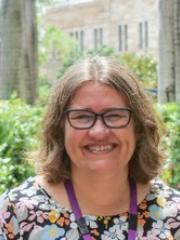Dr Natasha Hungerford

Natasha is a Research Fellow in the Natural Toxin group within the QAAFI Centre for Animal Science, based at the Health and Food Sciences Precinct (Cooper's Plains). She an organic chemist with an interest in natural products and is utilising analytical techniques such as liquid chromatography-tandem mass spectrometry, to look at natural toxins found in certain plants, such as pyrrolizidine alkaloids and simplexin. Current research aims to mitigate the effects of Pimelea plant toxins on cattle. Further collaborative projects involve the analysis of Australian honey and the novel beneficial properties of stingless bee honey.
Researcher biography
Dr Natasha Hungerford is an organic chemist and has extensive experience in natural products chemistry. She is a Senior Research Fellow leading the Natural Toxin group within the Centre for Animal Science, Queensland Alliance for Agricultural and Food Innovation (QAAFI) and is based at the Health and Food Sciences Precinct (Cooper's Plains). She joined QAAFI in 2016 and specialises in natural plant toxins and their impacts on livestock and human health, including food safety and regulations. Collaborative projects with government/industry have spanned mitigation of toxin impacts on cattle, to evaluation of toxins in honey (and health impacts). Subsequent examinations of stingless bee honey serendipitously led to the ground-breaking discovery of the rare sugar trehalulose as a major component of these honeys. Dr Hungerford continues to lead and manage projects to address agricultural industry challenges, including reducing methane gas emissions for a carbon neutral beef industry and international stingless bee honey development.
Dr Hungerford achieved her PhD in 1998, through the UQ School of Chemistry and Molecular Biosciences, and subsequently conducted postdoctoral research in natural products chemistry and in synthetic organic chemistry, at the University of Oxford, Australian National University, The University of Sydney, Griffith University and Memorial Sloan-Kettering Cancer Center.
